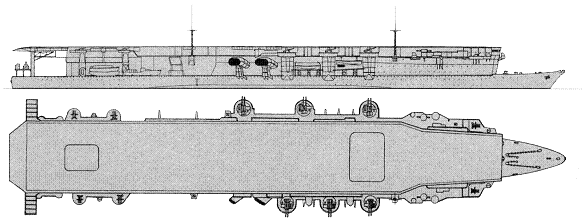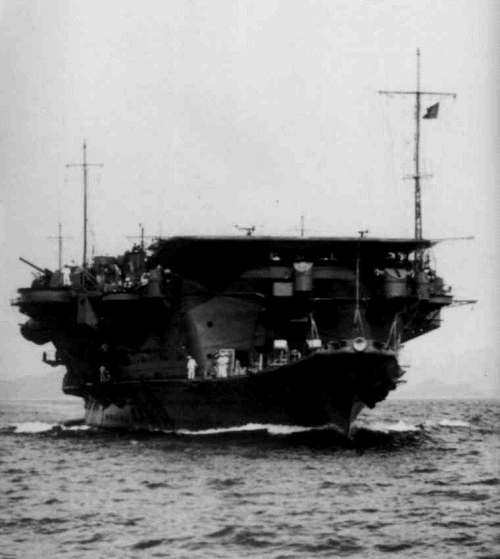

Ryujo 1933

Ryujo 1942
| Name | No | Yard No | Builder | Laid down | Launched | Comp | Fate |
| 龍驤 [Ryujo] | Yokohama Co, Yokohama | 26.11.1929 | 2.4.1931 | 9.5.1933 | sunk 24.8.1942 |
|
Displacement standard, t |
8000 |
|
Displacement full, t |
10150 |
|
Length, m |
167.0 pp 175.4 wl 179.9 oa |
|
Breadth, m |
20.3 wl 23.0 fd |
|
Draught, m |
5.56 |
|
No of shafts |
2 |
|
Machinery |
2 sets Kampon geared steam turbines, 6 Kampon boilers |
|
Power, h. p. |
65000 |
|
Max speed, kts |
29 |
|
Fuel, t |
oil 2490 |
| Endurance, nm(kts) | 10000(14) |
| Armour, mm | machinery and magazines: light splinter protection |
|
Armament |
6 x 2 - 127/40 89-shiki, 24 x 1 - 6.5/115, 48 aircraft (A1N, A2N fighters, C1M recon planes, B1M, B2M, B3Y torpedo bombers) |
|
Complement |
600 |
Aircraft facilities (fd - 3,600m², ha - ?m² / ?m³): Flight deck: 156.5x23.0m. Upper and lower hangars. There were fore (11.1x15.7m) and aft (10.8x8.0m) lifts. Aircraft fuel stowage: ?.
| Year | fighters | diving bombers | torpedo bombers |
| 12.1933 | 5 A1N2 | --- | 12 B1M |
| 7.1937 | 12 A2N and A4N | 15 D1A2 | --- |
| 12.1941 | 22 A5M4 | --- | 16 B5N2 |
| 8.1942 | 22 A6M2 | --- | 6 B5N2 |
Project history: She was built under the 1927 Programme. Small dimensions of the ship were formed by the limit of tonnage assigned on aircraft carriers by Washington Threaty. Though real displacement of Ryujo (nearby 10000t) appreciably exceeded officially declared (8000t), all the same her battle possibilities remained limited.
On an original design the hangar was assumed single-level, but during building it transformed to the two-level. It has allowed to increase number of air group, but simultaneously led to strong overload and decrease in stability of ship. In a year after commission of Ryujo it was necessary to send the ship on shipyard for reconstruction. During works in 1934-1936 carrier was equipped with bulges, increased a hull breadth on 0.5 m, and 1200t of a led ballast were laid. For decrease in the upper weight two twin 127mm mounts were demounted. The flight deck has not undergone changes. Small area of a flight deck did not allow to carry on it during runway operations more than six aircrafts because of what actions of Ryujo air group were ineffective. Because of the limited displacement it was impossible to apply on rigorous protection. As a result light splinterproof armour protection was received only by magazines and engine rooms.
Ship protection: Machinery and magazines had light splinter protection.
Modernizations: 1936: hull was bulged, 1200t of solid ballast were added. Displacement increased to 10600 / 13650t, dimensions were 179.9x20.8(wl)x7.08m; - 2 x 2 - 127/40, 24 x 1 - 6.5/115
1940: forecastle was raised at one deck; + 2 x 2 - 25/60 96-shiki, complement was 924.
1942: + 9 x 2 - 25/60 96-shiki, 12 x 2 - 13.2/76
Naval service: In battle at Eastern Solomons 24.8.1942 Ryujo was badly damaged by American carrier aircraft (Saratoga air group). One torpedo and four 454kg bomb hits called extensive fires and underwater breaches. 3.5 hours after attack carrier has turned over and sunk.

Ryujo 1934

Ryujo
© Ivan Gogin, 2008-14